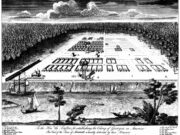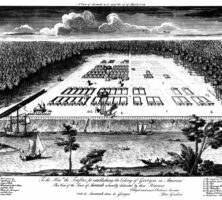A number of significant historical events have occurred in Georgia during the month of February.
1700-1749
1733
James Oglethorpe founded the colony of Georgia and subsequently laid out the plans for the city of Savannah, with the permission of Yamacraw chief Tomochichi.
1750-1799
1777
Georgia’s inaugural constitution, which created the state’s first eight counties, was adopted.

Courtesy of Kettle Creek Chapter of the National Society Daughters of the American Revolution
1779
The Battle of Kettle Creek took place.
1796
The state legislature passed the Rescinding Act, which nullified the Yazoo Act (also widely known as the Yazoo land fraud).
1800-1849
1803
Georgia’s first recorded camp meeting took place in Hancock County.

Courtesy of Library of Congress, Prints and Photographs Division
1825
The Creek Indians relinquished all their remaining land in Georgia by signing the 1825 Treaty of Indian Springs.
1828
Elias Boudinot published the first issue of the Cherokee Phoenix, a newspaper printed at New Echota in Cherokee and English.
1850-1899
1856
Atlanta Gas Light Company was incorporated.
1858
Pianist Sigismond Thalberg, assisted by violinist Henry Vieuxtemps, performed in Atlanta’s first notable classical concert at the Athaeneum Theater.
1863
During the Civil War, the ironclad CSS Savannah and the gunboat CSS Chattahoochee were launched.
1864
Andersonville, the infamous Confederate prison, was established in Macon County.
1870
The Georgia General Assembly ratified the Fifteenth Amendment to the U.S. Constitution, which prohibits denying the right to vote because of race or color.
1871
Jefferson Franklin Long became the first Black congressman to deliver an address to the U.S. House of Representatives.

Courtesy of Library of Congress, Prints and Photographs Division
1881
French actress Sarah Bernhardt performed in Atlanta for the first time.
1883
The Atlanta Journal made its debut.
1885
The Southern League, the first professional minor league baseball team in the South, was founded in Atlanta.
1892
The Battle of Atlanta Cyclorama, now housed at the Atlanta History Center, opened.
Southern college football was born when the University of Georgia played Auburn University in the first game of what is known today as the South’s oldest college football rivalry.
1900-1949
1926
Tiger Flowers became the first African American to win the world middleweight boxing championship.
The Atlanta Board of Education prohibited the teaching of evolution in the city’s public schools.
1930
The African American folk drama Heaven Bound debuted at the Big Bethel African Methodist Episcopal Church in Atlanta.
1937
The U.S. Supreme Court found in favor of Angelo Herndon, a member of the Communist Party in Georgia, who had been arrested and imprisoned for insurrection.
1939
Atlanta native J. Richardson Jones premiered a thirty-minute newsreel, Parade of Progress of Colored Atlanta, at the all-Black Bailey’s Royal Theatre on Auburn Avenue.
1940
The film Gone With the Wind won eight Academy Awards.

Smithsonian National Postal Museum
A tornado hit the Albany business district, causing $9 million in damages.
1941
Swamp Water, Vereen Bell’s acclaimed novel that brought national recognition to the Okefenokee Swamp region, was published.
1945
God Is My Co-Pilot, a film based on the classic wartime memoir by Georgia native and World War II hero Robert Scott, premiered.
1946
Helen Douglas Mankin became the first woman from Georgia elected to the U.S. Congress.
1950-1999
1951
The Georgia Historical Commission was created by the state legislature to promote and increase knowledge and understanding of the history of the state.
The film I’d Climb the Highest Mountain, based on a novel by Georgia native Corra Harris, opened.
1956
Thomas Brewer, a physician and civil rights activist in Columbus, was assassinated.

Courtesy of Columbus State University Archives
1960
Georgia governor Ernest Vandiver formed the Sibley Commission to investigate public opinion on the integration of public schools in the state.
1964
The Milwaukee Braves agreed to move to Atlanta, becoming the Atlanta Braves.
1970
The Georgia General Assembly ratified the Nineteenth Amendment to the U.S. Constitution, which took effect in 1920 and grants women the right to vote.
1978
Atlanta’s oldest hospital, Saint Joseph’s, opened its current location in north Atlanta.

Courtesy of Saint Joseph's Hospital
1994
MindSpring, an Internet service provider that later merged with EarthLink, was founded in Atlanta.
1998
Georgia resident David Satcher was appointed U.S. surgeon general.
Georgian Julian Bond was selected as chairman of the National Association for the Advancement of Colored People.
1999
The Atlanta Symphony Orchestra conductor laureate Robert Shaw posthumously won Grammy Awards for best classical album and best choral performance.

Courtesy of J.D. Scott
2000-Present
2002
The Home Depot cofounder, Arthur Blank, bought the Atlanta Falcons.
February Birthdays
February 9, 1752 George Handley, Georgia governor
February 17, 1755 Catharine Greene, cotton gin benefactor
February 28, 1766 John Clark, Georgia governor
February 24, 1772 William Harris Crawford, politician
February 11, 1794 Malthus Ward, horticulturist
February 13, 1794 John Leadley Dagg, religious figure
February 11, 1798 Joseph Vann, Cherokee leader
February 3, 1811 George Foster Pierce, religious figure
February 12, 1811 James Johnson, Georgia governor
February 11, 1812 Alexander Stephens, Civil War figure
February 23, 1821 Amos T. Akerman, U.S. attorney general
February 14, 1829 Alfred Iverson Jr., Civil War figure
February 6, 1832 John B. Gordon, Civil War figure
February 25, 1833 Clement Evans, Civil War figure
February 3, 1842 Sidney Lanier, poet
February 9, 1843 Berry Benson, Civil War figure
February 9, 1851 Nellie Peters Black, civic leader
February 9, 1868 Lucian Lamar Knight, journalist
February 18, 1868 Ina Dillard Russell, political matriarch
February 19, 1871 Lugenia Burns Hope, civic leader
February 21, 1872 Lettie Pate Whitehead Evans, business leader and philanthropist
February 15, 1877 Thornwell Jacobs, educator
February 14, 1881 Viola Ross Napier, politician
February 20, 1888 Ben Epps, aviator
February 24, 1889 Herbert L. Stoddard, ecologist
February 18, 1891 Sherrod “Sherry” Smith, baseball player
February 20, 1893 Susan Myrick, journalist
February 25, 1896 Ida Cox, singer
February 1, 1898 Leila Denmark, physician
February 5, 1898 Ralph McGill, journalist
February 5, 1900 Primus E. King, civil rights activist
[February 1901] J. Richardson Jones, journalist
February 7, 1905 Wally Butts, football coach
February 24, 1905 William Holmes Borders, civil rights activist
February 24, 1906 Clarence A. Bacote, civil rights activist
February 10, 1907 Grace Towns Hamilton, politician
February 13, 1907 Laura Belle Barnard, religious figure
February 22, 1908 Annie L. McPheeters, librarian
February 9, 1909 Dean Rusk, U.S. secretary of state
February 19, 1917 Carson McCullers, writer
February 2, 1923 James Dickey, writer
February 5, 1928 Sidney J. Marcus, politician
February 27, 1930 Joanne Woodward, actress
February 24, 1932 Zell Miller, Georgia governor
February 5, 1934 Hank Aaron, baseball player
February 7, 1936 John Stone, poet
February 11, 1936 Burt Reynolds, actor
February 16, 1936 Joe Frank Harris, Georgia governor
February 22, 1937 Tommy Aaron, golfer
February 10, 1938 Terry Kay, writer
February 3, 1940 Fran Tarkenton, football player
February 21, 1940 John Lewis, politician
February 28, 1940 Joe South, musician
February 27, 1942 Charlayne Hunter-Gault, journalist
February 9, 1944 Alice Walker, writer
February 21, 1956 Ha Jin, writer
February 2, 1962 Janisse Ray, writer
February 9, 1963 Travis Tritt, musician






